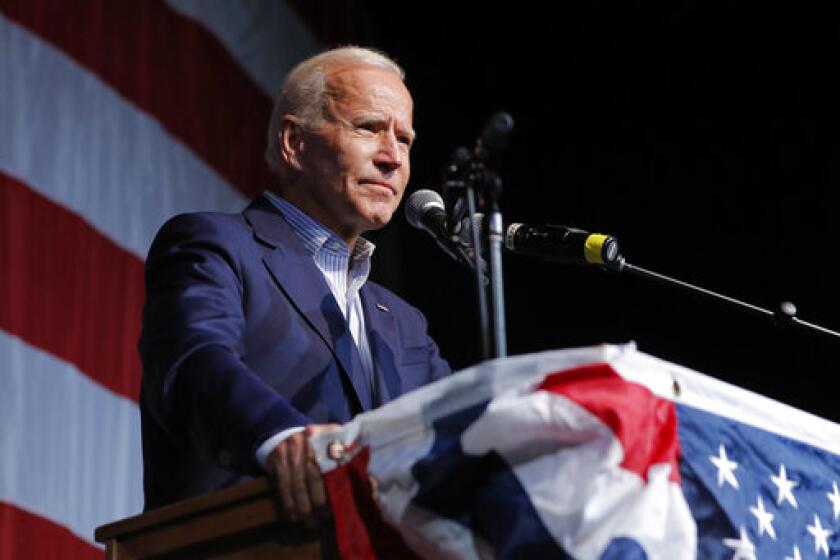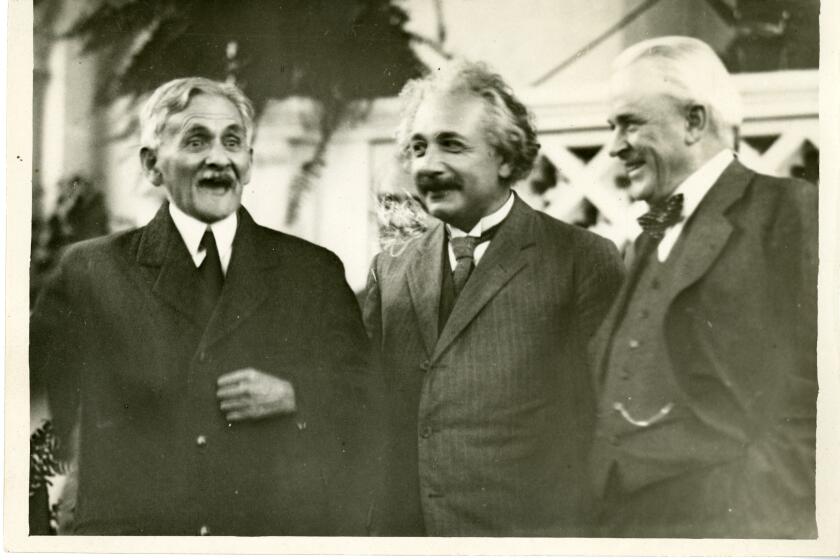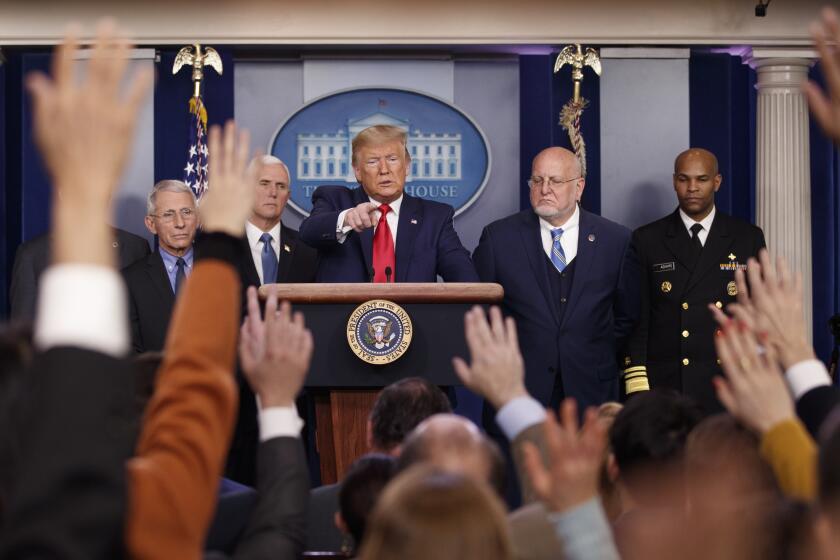Column: COVID-19 falsehoods lead Stanford to examine ties to right-wing Hoover Institution

- Share via
On Monday, Stanford University took a step that might be career-shattering in almost any field except academia: It formally distanced itself from a faculty member.
The faculty member is Scott Atlas, a neuroradiologist who is a senior fellow at Stanford’s Hoover Institution and a former professor at its medical school. At the moment, Atlas is a leading advisor on the COVID-19 pandemic to President Trump.
“Dr. Atlas has expressed views that are inconsistent with the university’s approach in response to the pandemic,” the university said.
There’s a huge difference between a partisan think tank whose mission is to promote free markets and small government ... and a research institution that is committed to free inquiry and objectivity.
— David Palumbo-Liu, Stanford professor
“Stanford’s position on managing the pandemic in our community is clear,” the statement continued. “We support using masks, social distancing, and conducting surveillance and diagnostic testing. We also believe in the importance of strictly following the guidance of local and state health authorities.”
Those practices have been attacked by Atlas, whose most recent statements include a tweet calling on Michigan residents to “rise up” against Gov. Gretchen Whitmer’s tightening of anti-pandemic measures, including the closing of indoor dining, theaters and stadiums.
Stanford’s statement was couched in the neutral terms common in academic disputes. But it points to an increasingly acrimonious discussion on the Palo Alto campus — whether Stanford should formally distance itself from the Hoover Institution, or at least redefine a relationship that has periodically exploded into political controversy.
The relationship has been strained this year by a stream of dubious claims about the pandemic issuing from Hoover Institution fellows, especially Atlas.
The claims have led to two public letters of complaint from Stanford faculty: A Sept. 9 letter signed by 110 Stanford medical faculty members criticizing Atlas for his “falsehoods and misrepresentations of science,” and an open letter signed by 123 university faculty members calling on the university to subject its relationship with the Hoover Institution to “careful renegotiation.”
A complete break in the relationship wouldn’t be simple. The Institution’s 285-foot red-domed tower, which houses its extensive library founded by Herbert Hoover and was dedicated in 1941, is the most distinctive landmark on the campus, visible for miles around.
Herbert Hoover’s personal relationship with the university ran deep. He was a member of its first graduating class, receiving his degree in 1895. He founded the Hoover Institution there in 1919, prior to his presidency but after amassing a fortune as a mining engineer and investor. For more than a decade after his defeat for reelection by Franklin Roosevelt in 1932, he lived in Palo Alto.
The Hoover Institution’s relationship with the university was codified in 1959 through a “constitution” drafted by Hoover and accepted by the university trustees that defined the institution, rather vaguely, as “an independent Institution within the frame of Stanford University.”
The university president formally recommends institution appointments, promotions and budget to the Stanford board of trustees, but academic committees are cut out of the process.
The institution’s “purpose,” as Hoover defined it in 1959, “must be, by its research and publications, to demonstrate the evils of the doctrines of Karl Marx — whether Communism, Socialism, economic materialism, or atheism — thus to protect the American way of life from such ideologies, their conspiracies, and to reaffirm the validity of the American system.”
Biden doesn’t need a Democratic Senate to save American healthcare reform.
That purpose is supported by an independent funding stream with conservative and libertarian sources such as the Koch family and the petroleum and chemical industries listed among its donors.
“There’s a huge difference between a partisan think tank whose mission is to promote free markets and small government — that constructs knowledge that undergirds a particular message — and a research institution that is committed to free inquiry and objectivity,” says David Palumbo-Liu, a Stanford professor of comparative literature. Palumbo-Liu is an author of the open letter.
The university administration’s response to these critiques has been ham-handed, to be charitable. At a faculty senate meeting on Oct. 22, University Provost Persis Drell observed that many Hoover fellows hold joint appointments on the Stanford faculty; the institution’s director, former Secretary of State Condoleezza Rice, originally joined the Stanford faculty as a political scientist in 1981.
“In the somewhat distant past, Hoover has been very disjointed from the rest of Stanford,” Drell said. “But over the past decade, Hoover has become much more integrated into Stanford.… In a very real sense, and I think this is important to keep in mind, they are, in fact, us.” (Drell’s late father, physicist Sidney Drell, was himself a Hoover fellow.)
Drell’s remark drew a rebuke from Branislav Jakovljevic, a theater professor, who wrote in the Stanford Daily that “they are not ‘us,’ nor do they wish to be, judging by the disdainful comments about Stanford’s academic programs made over the years by Hoover fellows and officials.”
Jakovljevic continued: “When I signed up to teach at Stanford, I was not told that part of my job would be to serve as a living shield for the Hoover Institution. I refuse to be used in that way. I am not them.”
A task force created to examine policies for naming campus buildings has been rattled by the resignation of one of its members, Sarah Sam.
The partisan character of the work of many Hoover fellows has caused angst on the campus in the past. In 1983, the faculty senate asked the university to “reassess” the relationship after dozens of Hoover fellows joined the Reagan administration.
The faculty’s concern then was that Hoover fellows were using Stanford’s name and reputation to give their partisan viewpoints a veneer of academic objectivity.
The same concern has now resurfaced on campus. “A lot of what comes out of the Hoover gets marketed as coming from Stanford, which is only geographically true,” Palumbo-Liu told me. “The Hoover in some ways is leaning on Stanford’s reputation as a research university with a commitment to science and facts in order to smuggle in very partisan and factually inaccurate pieces of information.”
The Stanford administration hasn’t taken an official stand on calls to revisit its relationship with the Hoover Institution.
The university pointed me to an Oct. 30 report in which President Marc Tessier-Lavigne responded to calls to sanction Atlas or dispute his statements about the pandemic by citing the university’s policy on academic freedom, which states: “Expression of the widest range of viewpoints should be encouraged, free from institutional orthodoxy and from internal or external coercion.”
Two weeks later, however, Stanford issued its statement questioning Atlas’ views. Hoover didn’t respond to my request for comment; nor has it issued a statement about Atlas.
Certainly the partisanship of some of the Hoover Institution’s output has not been stifled. Last year, during the run-up to the presidential election, the institution published an analysis of then-candidate Joe Biden’s economic agenda co-written by Kevin Hassett, a Hoover fellow who had been economic advisor to the Trump White House.
The U.S. has the worst record on COVID-19 among rich countries, by far. A new analysis spells it out.
The analysis purported to show that Biden’s policies would sharply shrink employment and cut real per-capita gross domestic product by 8%. These conclusions were based on the likelihood that Biden would raise taxes, “reverse much of the regulatory reform” of the Trump years, institute a green energy plan and make subsidies for health coverage under the Affordable Care Act more generous.
But the paper didn’t factor in potential gains from those policies such as more sustainable energy production or improved health for Americans with insurance. Nor did it note that the tax increases it attributed to Biden were actually enacted by Republicans as part of the 2017 tax cuts, which scheduled tax cuts for middle-income Americans to expire in 2026.
The most important misgivings about the Hoover Institution’s recent work focus on its approach to the pandemic, a flow of “faulty or dubious misinformation being pushed out in public,” observed the faculty open letter. (Josh Marshall of talkingpointsmemo.com has offered a useful compilation on Twitter.)
Among other Hoover works, the letter focused on articles by Richard Epstein, a conservative law professor at New York University with an appointment as a Hoover fellow. Epstein downplayed the pandemic in March with an article projecting that the U.S. would suffer only 500 deaths from the coronavirus. Soon after that, he claimed that the figure had been placed “erroneously” in the article, and he meant to write “5,000.”
In a subsequent article on April 20, Epstein argued that “over five weeks into the lockdown, it now appears that the response of the state governors to the coronavirus outbreak has become far more dangerous than the disease itself. ... What is distressing is that the restrictions are remaining or getting even tighter while the threat from the coronavirus is beginning to recede.”
The current death toll in the U.S. is nearly 250,000.
Most of the concern about Hoover-generated misinformation involves Atlas, who has been on a leave of absence from the Hoover Institution since taking on a higher profile at the White House. From his administration perch, he has advocated a policy aimed at promoting “herd immunity” — a natural immunity to the virus that most epidemiologists say can’t be achieved without a vaccine, except at the cost of thousands, even millions, of unnecessary deaths.
As the Stanford medical professors noted in their letter, “Encouraging herd immunity through unchecked community transmission is not a safe public health strategy. ... This approach would do the opposite, causing a significant increase in preventable cases, suffering and deaths, especially among vulnerable populations, such as older individuals and essential workers.”
Atlas has doubled down on his approach, not only calling on Michiganders to “rise up” against anti-pandemic measures, but promoting family gatherings for the holidays. The elderly “are now being told, don’t see your family on Thanksgiving,” he told Fox News. “For many people, this is their final Thanksgiving, believe it or not.”
The issues swirling around Stanford and the Hoover Institution won’t be resolved soon. Palumbo-Liu and colleagues are preparing a resolution to be presented to the faculty senate in February.
The faculty senate, however, has no power to force a change. “Our interest is in getting the administration to take a stand and clearly delineate the understandings” between the university and the institution, he says.
Tossing the Hoover Institution off campus “is not realistic,” Palumbo-Liu says. “It’s a permanent fixture, and we’ve accepted it. But we’re not accepting it unconditionally. We need to set some understandings up so that Stanford remains Stanford. We love the institution, and we hate to see it adulterated in this fashion.”
More to Read
Inside the business of entertainment
The Wide Shot brings you news, analysis and insights on everything from streaming wars to production — and what it all means for the future.
You may occasionally receive promotional content from the Los Angeles Times.














